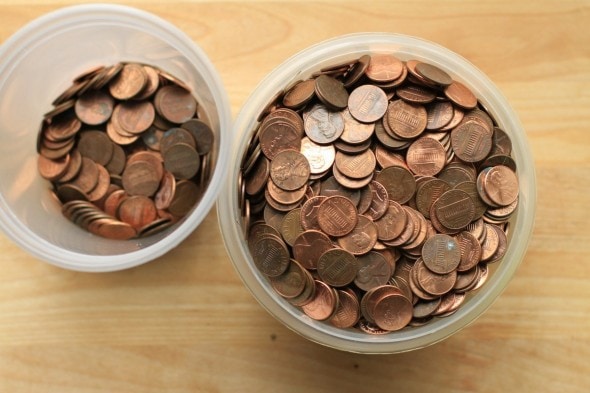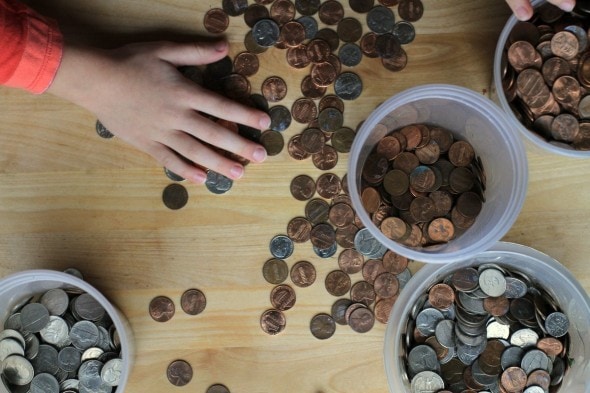When I posted about our almost-$1000.00 septic pump repair bill, I wrote that I was so grateful to have money put away for such situations, and in the comments on that post, we started talking about emergency funds.

Many personal finance gurus suggest saving up a $1000 emergency fund, and some of you were wondering if that’s enough.
(I am not a personal finance guru, so take what I’m going to say with a grain of salt!)
Although I think $1000 is a marvelous place to start, especially if you’re in a situation where you’re trying to pay off large debts, I would personally not be comfortable with a cushion that small, especially as a homeowner.
I say this based on personal experience because in the two homes we have not rented, the heat pump has gone up.
(We have very unfortunate luck with heat pumps, apparently.)
If you’ve ever gone through that, you know that a dead heat pump is a pretty darn pricey “unexpected” expense.
And a $1000 emergency fund doesn’t come close to covering it. Even the heat pump for our townhouse cost us over $3000.
Thankfully, despite our not-so-high-income, we’d managed to sock away a little over $3,000 in our savings account and so we weathered that expense without incurring any debt.
So, how much do I think is enough for an emergency fund?

Well, 3-6 months of expenses is pretty ideal to me, but if you can’t do that, I think getting as close as possible is wise.
(Note that I’m talking about 3-6 months of expenses, not 3-6 months of income. I calculated ours by adding up the bare minimum we’d need to spend to get by if we suddenly lost all of our income.)
Our goal has always been to get 3-6 months of living expenses in the bank, but during Mr. FG’s warehousing days, we never quite managed to get there. We did always manage to save something, though, and while it wouldn’t have been enough to sustain us through 6 months of unemployment, it was enough to keep us from having to use any form of debt to pay for expenses that popped up.
So, I guess my recommendation is to do your best to get to that 3-6 month level, but realize that any emergency fund is better than none and don’t give up if you can’t seem to get to the 3-6 month spot.
On that note: I have a whole post rattling around in my head about this, but for now I’ll just say that if you haven’t got a lot of money to work with, don’t beat yourself up about not being able to put a $10,000 emergency fund away. Just do the best you can with what you’ve got, and know that small amounts of saving do add up and they do make a difference. Mr. FG and I managed to save up several thousand dollars when we were living on $35,000 and it all came in little bits and pieces.
__________________
I’m curious to hear your thoughts on this…how much do you think is enough for an emergency fund?

Jenny
Friday 7th of April 2017
I saved up $2000 before paying down debts. I am not a home owner, or a car owner. I just felt better about this. It's not a whole lot more, but it made me feel just a little bit safer. My expenses are really low too. My boyfriend's job is a little more unstable so I recommended 3.5k for him. He is currently building up his fund by saving $700 a month. My boyfriend is not a home owner and is an auto mechanic. lol
Tracy
Wednesday 16th of April 2014
I'm late to reading all this! I agree $1000 isn't enough savings, but I think also Dave Ramsey, Suze Orman are out of touch with the income and necessities of American life. As are our political representatives...
$6000 is a typical health insurance out-of-pocket for example. So that needs to be accessible as well as the other savings.
I have found more and more the numbers simply don't add up to do everything we're supposed to for financial security, for example do I purchase health insurance or pension- it's not possible to do both any more!
uclalien
Tuesday 15th of April 2014
It really depends on the individual situation. In my opinion, a reserve fund that could cover 3 months of expenses should be the very minimum and should be viewed as a starting point. If you lose your job and only have $1,000 saved, you're in big trouble. If you have 3 months of savings, it may give you time to find a new job, but may still be insufficient.
If you're in a two-income household, 4-8 months of expenses is ideal because the loss of one income won't eliminate all of your cash inflows (depending on how lopsided each salary is). If you are single or the sole breadwinner, a minimum of 9-12 months of savings should be your goal.
If we have learned anything from the recent financial meltdown, a solid work history, diploma from a big name university, and great references don't make a person immune from extended periods of unemployment.
Theresa
Saturday 5th of April 2014
Ultimately, you save the best you can and leave the rest to God.
Retired by 40
Thursday 27th of March 2014
I know Dave Ramsey says it should be $1,000, but I disagree! I believe that your EF should be twice your largest insurance deductible. That way, should things go terribly wrong, you know you are covered. What is point of having a $1,000 EF when your home insurance deductible is $2,000 +? An insurance claim would leave you scrambling to come up with the extra for the deductible!